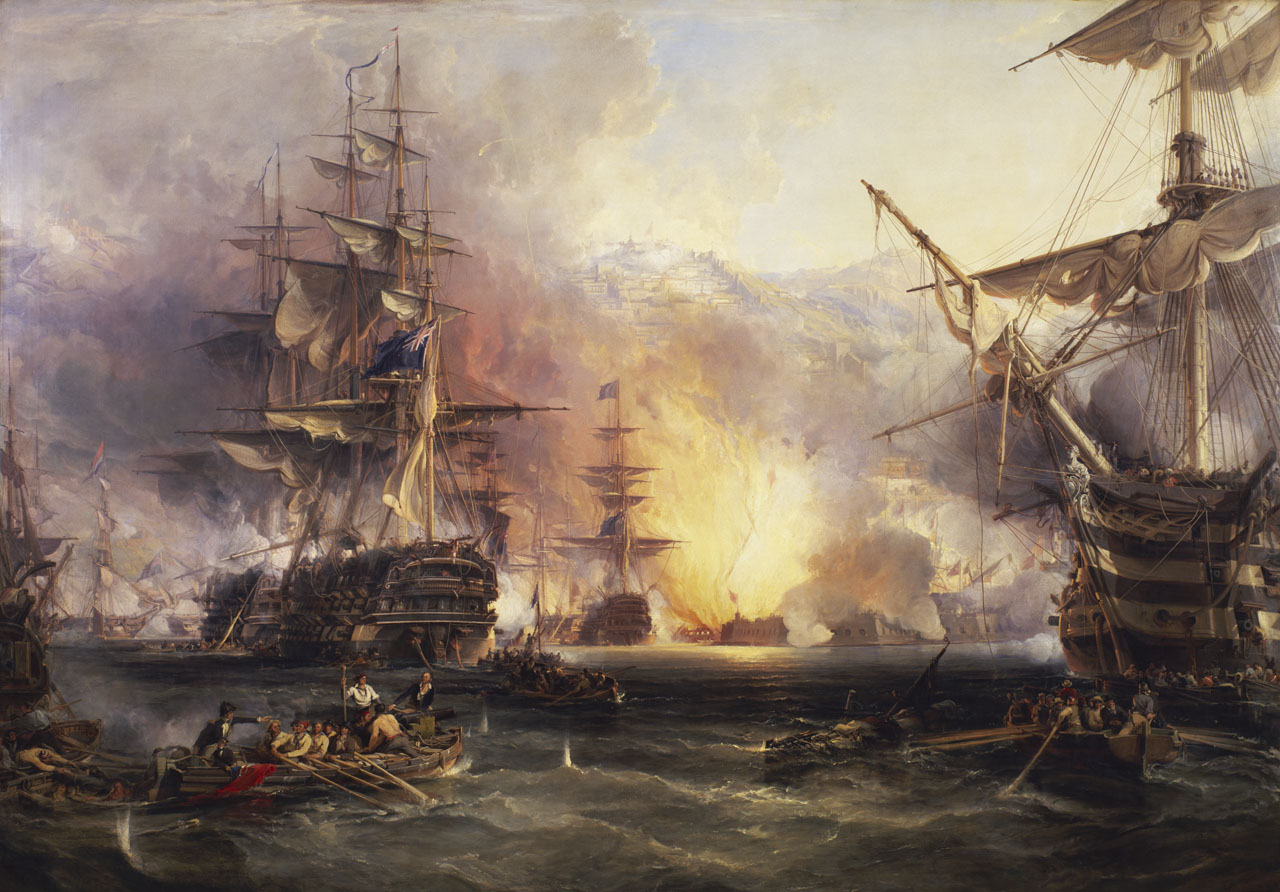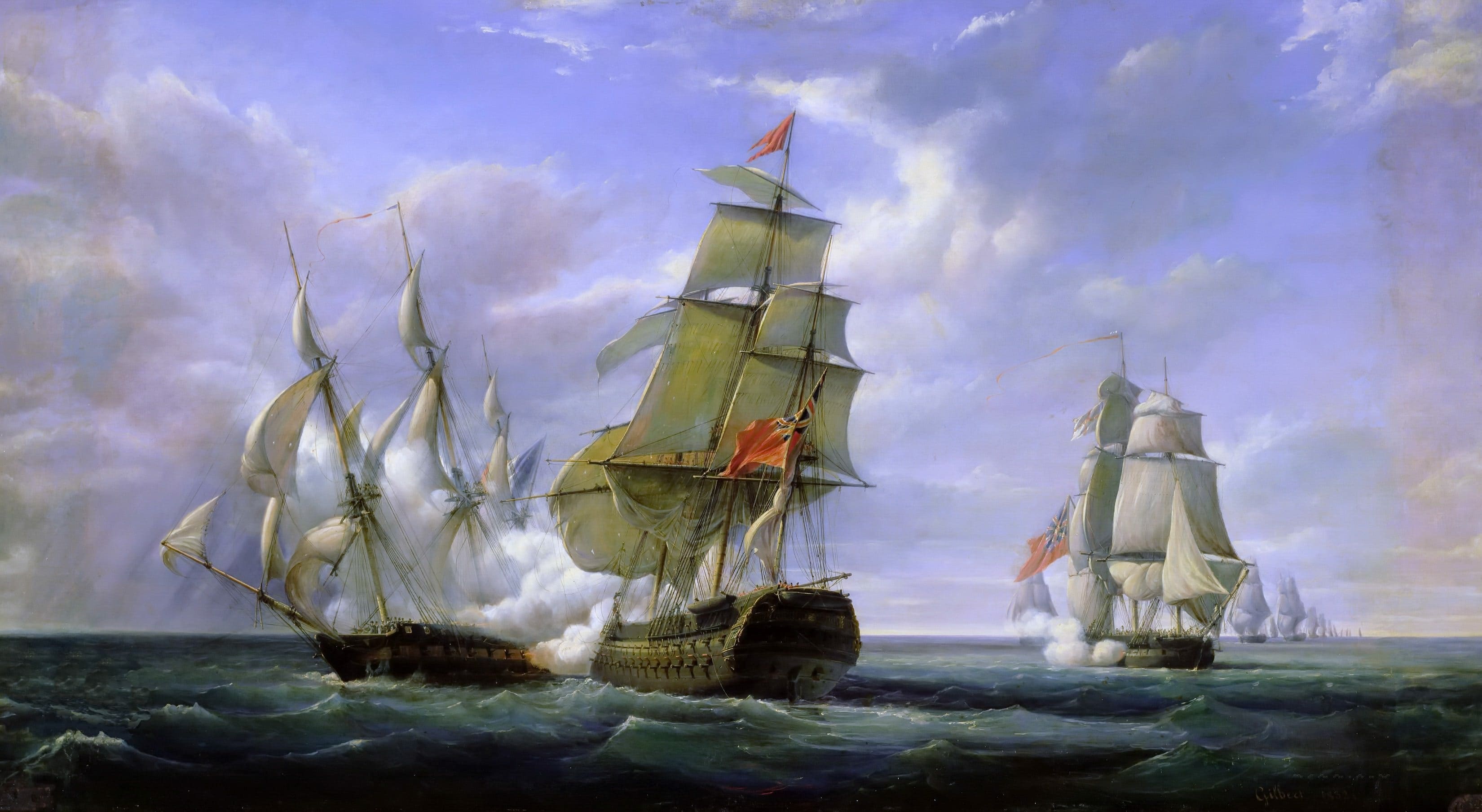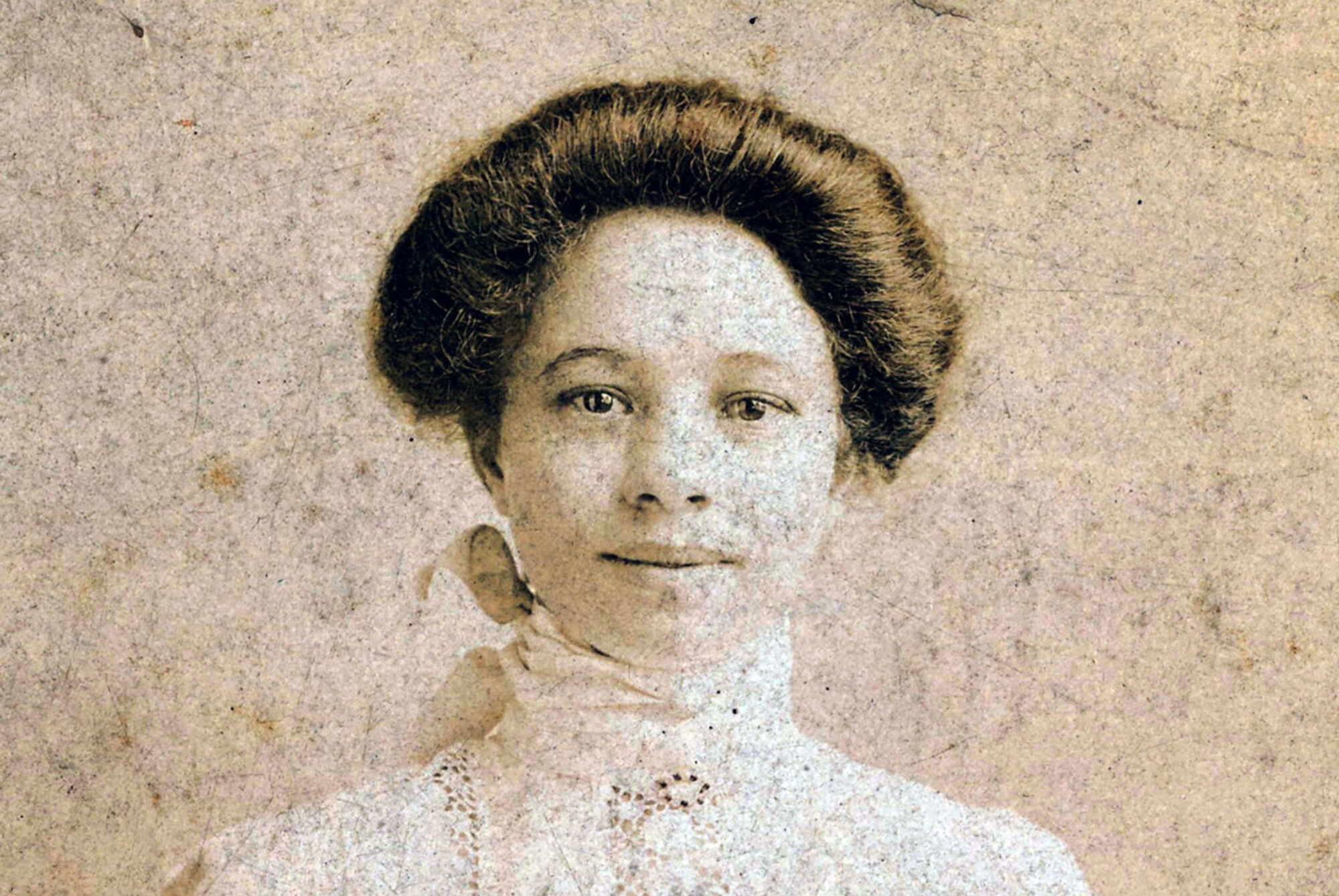Last night I had insomnia from hell. With just three hours of sleep, I don’t have enough functioning brain cells to design or write, so I’ve decided to clean up more text from the 1839 London Saturday Journal articles on the British Navy. I think articles like these add greater context when you are watching Russell Crowe in Master and Commander for the twelfth time or passing yet another Saturday re-watching every episode of Hornblower.
The images and descriptions of flags come from An epitome, historical and statistical, descriptive of the Royal naval service of England, by E. Miles with the assistance of L. Miles.
If you haven’t already done so, you may want to read the first exciting installment of this series.
So, enjoy and learn from the following excerpt:
“Hearts of oak are our ships,
Jolly tars are our men.”

The total number of persons comprising the crew, or complement, (as it is called,) of a seventy-four gun ship, amount, in time of war, to 650: in peace, the company is one hundred less; the reduction being made in the number of seamen: the officers and petty officers in each class are the same in peace and war.
The following is the classification, with the rate of pay to each. We shall specify their particular duties hereafter.
The first or senior lieutenant, if he has held that rank seven years has 11l. 0s. 4d. per month. When a commander is on board, his pay is 23l. 0s. 4d. per month.
When the surgeon has served six years in that rank, he obtains an increase of pay of 1s. per day up to ten years; from ten to twenty years, he has 14s. per day; and after twenty years’ service, 18s. per day.
The naval instructor has, besides, a bounty of 30l. and 5l., per annum each of his pupils, which is deducted from their pay.
The captain maintains an establishment of his own: all the others included in the above enumeration, together with the officers of royal marines, are called “Wardroom Officers,” and they mess in the centre of a room so styled, on each side of which are their respective cabins for sleeping.
The carpenter is allowed 7s. per month additional for tools.
These are called the “Warrant Officers:” each has a separate cabin in the fore-part of the ship, in the neighbourhood of his storeroom, and each has a boy to attend upon him.
Sixteen mates and midshipmen, in whatever proportion the captain may desire, hut generally as follows:
These are called the “Gentlemen;” and they either mess together in the gun-room (the gun-room is situated under the ward-room, and the ward-room under the captain’s cabin, which is under the poop. These are tiers — or floors– of rooms lighted from the stern windows and side-ports) or in two divisions, in berths (rooms) on each side of the orlop-deck, in that part called the “cockpit.”

The orlop desk is immediately beneath the lower tier of guns, and appropriated to the stowage of the cables, and also to various store-rooms. To that portion known as the cockpit the men wounded in battle are carried to the surgeon. In the midshipsman’s berth on the left-side of H.M.S Victory. (called the larboard berth,) the heroic Nelson breathed his last at Trafalgar. The spot (as well as that on which he fell; denoted by a brass mark on the quarter-deck, is eagerly inquired after by the visitors to that ship is Portsmouth.
They above are called “First-class Petty Officers before the Mast.” They mess indiscriminately amongst the crew, with the exception of the first three, who have a screened birth on the lower deck.
The carpenter’s mates have 7s. per month for additional tools.
The above are called “Second-class Petty Officers”
To these (including 125 marines) are added as many sailors as will make up the number of the crew to 650. The sailors are rated able, ordinary, or landmen, according to their ability. The able seamen, denominated A.B.’s, have 34s. per month, and are qualified to perform every part of a seaman’s duty. The ordinaries are half seamen, who do not profess to steer, heave the lead, &c.; their pay is 26s. per month: and the landmen are persons who have only been a trip or two to sea, and not reared as mariners; their pay being 23s. per month. It is usual, however, for ships of this rate to carry considerably more boys than the number specified in the scale, particularly boys of the first class, from seventeen to twenty years of age; as they grow up, they are rated landmen, and afterwards ordinaries; but few attain to the rating of A.B. who have not been brought up to the sea from childhood.

There is no limitation as to the number of sailors in each class, so, of course, every commander endeavours to obtain as great a proportion of A.B.’s as possible; and upon his success in this respect depends the question of whether the ship is well or ill manned.
It is by no means necessary, however, that the whole of a ship’s crew shall be able seamen, because many of the duties can be performed very well by ordinaries, and even landmen. Boys are objectionable in ships of war, because the navy is not a good school to train them to seamanship; while they increase the number, and are equally expensive to maintain, (the only saving being in the difference of wages,) they add but little to the physical strength of the crew.
The party of marines consist of
If a brevet major, 17l. 10s. per month.
[First Lieutenant] – After seven years, 10l. 10s. per month
Colour Serjeants, 2l. 14s. 1d. per month
[Corporals] – After fourteen years’ service, 1l. 12s. 1d. per month; and (if enlisted prior to 14th January, 1823) from seven to fourteen years, 1l. 9s. 9d. per month.
[Privates ]- After fourteen years’ service, 1l. 4s. 1d. per month; and (if enlisted prior to 14th January, 1823) from seven to fourteen years, 1l. 1s. 9d. per month.
The officers, warrant officers, young gentlemen, some of the petty officers, and the marines, are got together within a few days after the pendant is hoisted; the seamen are entered as they present themselves on board, and also at the rendezvous on Tower-hill, in London, which is always open for the reception of seamen who volunteer for a particular ship or for general service (Men who enter general service are available for any ship or station whereon required.) Sometimes houses are also opened in the large seaports; but this is rarely necessary, except when an increase is made to the number of men employed; for the generality of seamen, when discharged from one ship, find their way to another, preferring the treatment and comforts of the naval service to the usage they encounter in merchant vessels.
When a volunteer presents himself, he is questioned by the commanding officer as to his qualifications in seamanship. If he has served his apprenticeship in the regular manner, he is at once presumed to be quite capable of an able seaman’s duty, and obtains the rating of A.B. Good men generally stipulate, however, for petty officers’ ratings; but these are reserved as long as possible, for the rigging of the ship affords sufficient test by which to determine who are the best entitled to them.
If a man has served in the navy before, he produces his certificate, of which the following is the form; and by this his character and capability are ascertained.
Sufficient space is left upon this certificate (which is of doubled parchment, and inclosed in a tin case) to enter the names of any other ships in which the man has served; and an inspection of the above will show that the items respecting Revenge have been taken from his oral testimony. In fact, at the period of his service in that ship, these forms (which were introduced not long since, by the late Vice-Admiral Sir Pulteney Malcolm,) did not exist.
The reverse of the certificate contains a very minute description of the man’s person; such as age, stature, complexion, colour of hair and eyes, marks, wounds or scars; also his place of birth and usual residence; and if he has been discharged or invalided on account of any complaint or physical defect, such cause is noted thereon.
When the officer has satisfied himself as to the man’s character and ability, he is handed over to the surgeon, by whom he is required to strip, in order that he might undergo a minute inspection as to his physical condition. If any defects, however trifling, appear, or If he is more than forty-five years of age, he is at once rejected; but if passed by the doctor, he is entered on the books, and the clerk takes charge of his certificate, which is returned to him, filled up with the date of his servitude and the character he has acquired—such as “good,” “very good,” “excellent,” &c., —attested by his captain, and when discharged.
Seamen, owing to their habitual carelessness, very often lose their certificates; in which case, on giving them new ones, it is usual to take down their statement as to the ships they have already served in. As a register is made from the ship’s books of every man’s service, and preserved in the archives of the proper department at Somerset House, his claim for pension does not suffer by the loss of his certificate.
As soon as a candidate is accepted, he is placed in the starboard or larboard watch, and some station in the ship assigned him. He is at liberty to choose his own messmates, end the messes are formed of parties of twelve in each. Having made his choice, he can only change his mess once a month. This regulation is necessary to prevent trouble and confusion in the distribution of provisions. It is desirable that one or more of the petty officers should belong to each mess, but the selection of messmates is seldom interfered with by the officers. The mess tables are placed between the guns on the lower deck; the marines occupying those next the gunroom. The seamen’s tables are from thence forward.
In most vessels of the class we are describing, the whole of those enumerated as the “Gentlemen” mess together in the gunroom. They usually elect the clerk, or one of the oldest of the mates, “caterer;” and, the ship’s allowance of provisions being ample, a small contribution in aid thereof enables them to support a very good table, little inferior indeed to that of the ward-room. The usual subscription is about 25s. per month, (In some ships the mess-subscription is more, and there is always as entrance, generally five pounds, which is returned to a member leaving to join another ship.) and this is applied to procure the necessary cooking utensils, crockery, glass, &C. &c., as well as vegetables, poultry, white sugar, condiments, and various other articles not included in the ship’s allowance. The midshipmen are not permitted to carry live stock to sea, and therefore must put up with salt meat, except in harbour; but in every other respect a provident caterer will manage, with the above subscription, to maintain a comfortable mess. The oldsters, such as the mates, second master, assistant surgeons, and some of the midshipmen, take their allowance of grog and wine, and also appropriate the youngsters’ share, assuring them it is not good for their health.
In harbour, it is also usual for these oldsters to drink their wine, which they are enabled to procure free of duty. They have a steady man appointed to act as steward; and he has a cook, and perhaps a marine, to assist him. The meals in the gun-room are served at the same time as the ship’s company generally; the hour of breakfast being eight o’clock, dinner at noon.
The ” Officers” mess in the ward-room, and maintain a greater profusion and variety on their mess-table, at sea particularly, owing to their being permitted to carry live stock—sheep, pigs, and poultry. The subscription is generally about 45s. per month, but this is independent of wine, which is supplied duty free. Members of the ward-room mess have the option of taking their wine or not; the allowance to those who do is half a bottle, and if they require an extra quantity, it is charged to such as remain at table at a regulated price.
One, sometimes two, gentlemen from the gun-room are invited daily to dinner in the ward-room, and the guest is always placed at the left hand of the president, and treated with marked attention. In harbour, to avoid the inconvenience of having strangers continually on board, one day in the week (generally Thursday) is set apart for the purpose; and on this day strangers from the shore or from other ships are invited, and better fare than ordinary provided. The purser or one of the marine officers is generally appointed caterer of the ward-room mess; and the usual dinner-hour at sea is two or half-past two o’clock, when the members are assembled hy the drum and fife to the tune of “The Roast Beef of Old England.” Naval messes cannot make a display equal to the messes of regiments; because not only are the officers subject to constant changes, but the ships are kept in commission and the members held together for comparatively short periods. For these reasons no great expense can he incurred for linen, glass, china, table ornaments, or plate; the profusion of which, accumulated for years in military messes, gives to the establishments an appearance not inferior to what the wealthiest of our nobility can display. In ships of war, every officer is expected to provide a couple of silver spoons and forks, and these form the whole of the mess plate; each member also furnishes a clean table-cloth in his turn, and this is the amount of the mess-table linen. It would be desirable that some other articles of plate, &c. should be furnished by the government, such being the case in foreign navies, the officers paying a trifle for the use of them; for a handsome display has a very great effect on foreigners, and in this respect our ships suffer in comparison with those of rival nations.
We have alluded to a subscription for wine, which is necessary, notwithstanding that each person on board is allowed a portion of wine, spirits, or beer, described in the scheme; but the ship’s allowance is never produced at the ward-room table: that, with other articles of provisions not drawn from the purser, being paid for at a regulated price, and the assets thrown into the mess-fund. In fact, any person on board is at liberty to leave whatever portion of his allowance he thinks proper undrawn, and receive payment in lien.
There is another matter in which naval messes suffer in comparison with the military. By long-established regulation, the officers of the navy and army are allowed their wine duty-free. When the article is purchased from a wine-merchant, he becomes entitled to the drawback, upon the production of an officer’s certificate: but this practice was found to he attended with inconvenience on shore, and some years back, his late Majesty, George the Fourth, assigned a certain sum per annum to each regimental mess, and to the engineers, artillery, and marines, in compensation for the duty, which from thenceforth was paid, as is usual with the public, in the purchase of their wine. This allowance is a liberal one; it considerably exceeds the duty of all wine consumed, and the excess makes a handsome item in addition to the mess-fund. Moreover, as many regiments are serving abroad, where no duties exist upon wine, the whole of the allowance is so appropriated. It is strange that this indulgence has not been extended to naval officers, more particularly as they labour under other disadvantages which do not apply to their military brethren; the captain particularly, who, by the customs of the service, maintains at his individual expense a table for the reception of several of his officers every day; whilst the colonel of a regiment has no such obligation, his mess expenses being little more than the youngest ensign’s.
In our next we shall describe the routine of the captain’s establishment.










